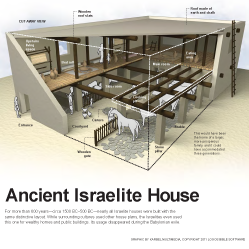2:1–24 In this chapter, Joshua sends spies to Jericho where Rahab, motivated by faith in Yahweh, protects them. |
2:1 Acacia Grove The precise location of Shittim, which means “acacia trees,” is unknown (see Num 25:1 and note; Num 33:49 and note).
entered the house of a prostitute The narrative avoids terminology that would suggest any sexual contact took place. If this had been the meaning, the phrase “the house of” would have been omitted (compare Judg 16:1).
2:2 The king of Jericho was told The text does not inform the reader how anyone found out about the spies. Something about their dress, manner, or language may have raised suspicion.
2:5 I do not know Rahab lies and provides the king’s men with misinformation to put them off the track of the Israelite spies (see Josh 2:9).
2:6 stalks of flax Likely served as bedding or fodder for animals Rahab owned.
the roof While this may refer to a bare roof, it likely refers to the second story of the house. Ancients often used this area for storage. In this location, the spies would be out of earshot of others staying in the house and would be concealed from sight.
2:7 the gate Refers to the city gate.
2:9 I know Compare “I do not know” (Josh 2:5); the narrative contrasts her lie with a sincere confession.
Yahweh has given you the land Rahab confesses belief in Yahweh as the supremely powerful God. The statement is noteworthy, since the Canaanites worshiped multiple deities (see Exod 23:24, 32–33; 34:15; Deut 11:16, 28; 12:2–3, 30–31). See Josh 2:11.
dread of you has fallen on us This fear was prophesied at the crossing of the sea (Exod 15:16). At the end of the Sinai law code, God promised to send the fear of Himself on the Canaanites (Exod 23:27).
2:10 the waters of the Red Sea See Exod 13:17–14:29.
Sihon and Og Kings who led the Amorites in the Transjordan. Og was a Rephaite giant related to the Anakim, the group of giant people before whom Israel cowered, resulting in the punishment of the 40 years of wilderness wandering (Num 13–14). See Num 21; Deut 2–3.
 Giant Clans in the Old Testament
Giant Clans in the Old Testament
whom you utterly destroyed The Hebrew term used here, cherem, refers to the destruction of life—human and otherwise—as an act of devotion to a deity (here, Yahweh of Israel; see note on Exod 2:20).
2:11 no courage was left in anyone They will not fight because they are resigned to their fate and fearful of that fate.
in the heavens above and on the earth below Rahab confesses the absolute and unique sovereignty of Yahweh. The only other uses of this phrase in the ot also appear in the context of God’s exclusive claim to sovereignty (Exod 20:4; Deut 4:39; 5:8).
2:12 by Yahweh Rahab asks for an oath in the name of the God in whom she believes and whom the Israelites worship.
You must give me a sign of good faith The Hebrew phrase used here, oth emeth, literally means “sign of truth.” The spies comply (see Josh 2:12–14, 16–21).
2:14 Our lives for yours The spies take a blood oath, pledging their lives against hers and her family’s.
2:15 her house was on the outer side of the wall It is unclear how Rahab speaks to the men after lowering them out her window.
2:18 this scarlet cord in the window The cord is not a condition of the oath (see Josh 2:12) but a practical means to identify Rahab’s house. If she forgets the cord, they would be guiltless if she died, since they would have difficulty identifying her location.
2:19 goes outside the doors of your house To make sure all her loved ones were safe, Rahab had to ensure they would be in the house.
2:22 they stayed there three days The spies hid three days before resuming their trip back to the camp of Israel.

|
About Faithlife Study BibleFaithlife Study Bible (FSB) is your guide to the ancient world of the Old and New Testaments, with study notes and articles that draw from a wide range of academic research. FSB helps you learn how to think about interpretation methods and issues so that you can gain a deeper understanding of the text. |
| Copyright |
Copyright 2012 Logos Bible Software. |
| Support Info | fsb |
 Loading…
Loading…


